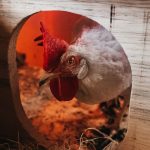Gnats are small flying insects belonging to the family Culicidae, commonly found in damp environments. They are known for their irritating bites, which can cause discomfort and stress to both goats and chickens. Gnat bites can result in itching, irritation, and potential allergic reactions.
In severe cases, gnats may transmit diseases to livestock, posing a significant health risk. Understanding the impact of gnats on farm animals is crucial for implementing appropriate protective measures. These insects are attracted to moisture and organic matter, making barns, coops, and pastures ideal breeding grounds.
Gnats are most active during warmer months, increasing the vulnerability of goats and chickens to infestations during this period. The constant presence of gnats can cause agitation and stress in animals, leading to decreased productivity and compromised well-being. Gnat bites can also create open wounds, potentially leading to infections and additional health complications.
Farmers and animal owners must be proactive in preventing and managing gnat infestations to maintain the health and comfort of their livestock.
Table of Contents
- 1 Creating a gnat-free environment for goats and chickens
- 2 Natural remedies for repelling gnats from goats and chickens
- 3 Proper grooming and maintenance to prevent gnat infestations
- 4 Using protective gear and barriers to keep gnats away from goats and chickens
- 5 Implementing dietary changes to deter gnats from bothering goats and chickens
- 6 Seeking professional help for severe gnat infestations
- 7 FAQs
- 7.1 What are gnats and why are they a problem for goats and chickens?
- 7.2 How can I keep gnats off my goats and chickens?
- 7.3 Are there any specific plants or herbs that can help repel gnats from goats and chickens?
- 7.4 What are some signs that my goats and chickens are being bothered by gnats?
- 7.5 Are there any specific products or remedies that are safe and effective for keeping gnats off goats and chickens?
Key Takeaways
- Gnats can cause irritation and stress to goats and chickens, leading to decreased productivity and health issues.
- Creating a gnat-free environment for goats and chickens involves proper waste management and regular cleaning of living areas.
- Natural remedies such as essential oils and herbal sprays can effectively repel gnats from goats and chickens.
- Proper grooming and maintenance, including regular bathing and trimming of feathers, can help prevent gnat infestations.
- Using protective gear such as fly masks and installing barriers like screens can help keep gnats away from goats and chickens.
- Implementing dietary changes, such as adding garlic or apple cider vinegar to their feed, can deter gnats from bothering goats and chickens.
- Severe gnat infestations may require professional help, such as consulting a veterinarian or pest control expert.
Creating a gnat-free environment for goats and chickens
Eliminate Breeding Grounds
Fixing leaks, regularly cleaning water troughs, and ensuring proper drainage can help eliminate breeding grounds for gnats. Additionally, keeping barns and coops clean and well-ventilated can reduce the presence of gnats.
Natural Repellents
Using natural repellents such as citronella candles or essential oils can be an effective method for creating a gnat-free environment. Strategically placing these repellents around barns and coops can deter gnats from entering the area.
Physical Barriers and Airflow
Installing screens on windows and doors can help prevent gnats from entering the living spaces of goats and chickens. Furthermore, using fans in barns and coops can create airflow that makes it difficult for gnats to fly around, reducing their presence significantly.
Natural remedies for repelling gnats from goats and chickens

In addition to creating a gnat-free environment, there are several natural remedies that can be used to repel gnats from goats and chickens. One effective method is to use apple cider vinegar as a natural gnat repellent. Mixing equal parts of apple cider vinegar and water in a spray bottle and applying it to the animals’ fur or feathers can help deter gnats from biting.
Additionally, adding apple cider vinegar to the animals’ drinking water can also help repel gnats from bothering them. Another natural remedy for repelling gnats is the use of essential oils such as lavender, eucalyptus, or peppermint. These oils can be diluted with water and sprayed onto the animals or diffused in the barns and coops to create a gnat-free environment.
Planting gnat-repelling herbs such as basil, mint, or rosemary around the barns and pastures can also help keep gnats at bay. These natural remedies are not only effective in repelling gnats but also safe for the animals and the environment.
Proper grooming and maintenance to prevent gnat infestations
Proper grooming and maintenance of goats and chickens are essential in preventing gnat infestations. Regular grooming of the animals’ fur or feathers can help remove any gnats that may be present and prevent them from laying eggs. This can be done by using a fine-toothed comb or brush to carefully inspect the animals’ coat or feathers for any signs of gnats.
Additionally, keeping the animals’ living spaces clean and well-maintained is crucial in preventing gnat infestations. Regularly cleaning out the barns, coops, and pastures will help eliminate any potential breeding grounds for gnats. This includes removing soiled bedding, manure, and any decaying organic matter that may attract gnats.
Proper waste management is also important in preventing gnat infestations, as accumulated waste can attract gnats and other pests. By implementing regular grooming and maintenance practices, farmers and animal owners can significantly reduce the risk of gnat infestations in their goats and chickens.
Using protective gear and barriers to keep gnats away from goats and chickens
Using protective gear and barriers is another effective method for keeping gnats away from goats and chickens. For goats, using fly masks or sheets can help protect them from gnat bites while they are out in the pasture. These protective gear items are designed to cover the animals’ eyes, ears, and body, providing a physical barrier against gnats.
Additionally, using mesh wraps or leg bands on goats can help prevent gnats from biting their legs, which are common targets for these pesky insects. For chickens, providing them with a dust bath area filled with diatomaceous earth or wood ash can help deter gnats from bothering them. Chickens naturally dust bathe to keep their feathers clean and healthy, and adding gnat-repelling substances to their dust bath area can provide an extra layer of protection against these insects.
Installing fine mesh screens around the coop windows and doors can also help prevent gnats from entering the living spaces of chickens. By using protective gear and barriers, farmers and animal owners can effectively minimize the risk of gnat infestations in their goats and chickens.
Implementing dietary changes to deter gnats from bothering goats and chickens

Natural Repellents in Feed and Water
Adding garlic or apple cider vinegar to the animals’ feed or drinking water can help repel gnats. Both garlic and apple cider vinegar have natural repellent properties that can deter gnats from biting the animals.
Fresh Herbs for Gnats Control
Providing goats with access to fresh herbs such as mint or basil in their pasture can also help repel gnats. For chickens, adding herbs such as oregano or thyme to their feed can make their blood less appealing to gnats. These herbs contain natural compounds that can alter the odor and taste of the animals’ blood, making them less attractive to gnats.
Boosting Immunity through Nutrition
Ensuring that goats and chickens have a balanced diet rich in essential nutrients can help boost their immune systems, making them less susceptible to gnat bites and potential infections. By implementing dietary changes, farmers and animal owners can provide their goats and chickens with an extra layer of protection against gnat infestations.
Seeking professional help for severe gnat infestations
In severe cases of gnat infestations, it may be necessary to seek professional help to effectively manage the problem. Pest control experts or veterinarians with experience in livestock management can provide valuable insight and assistance in dealing with severe gnat infestations in goats and chickens. They can conduct thorough inspections of the animals’ living spaces, identify potential breeding grounds for gnats, and recommend appropriate treatment methods.
Professional pest control services may also offer specialized treatments such as insecticide sprays or fogging to eliminate adult gnats and their larvae from the environment. These treatments should be carried out with caution to ensure the safety of the animals and the environment. Additionally, veterinarians can provide medical treatment for any animals that may have suffered from severe gnat bites or related health issues.
In conclusion, understanding the impact of gnats on goats and chickens is crucial for farmers and animal owners in order to protect their livestock from potential harm. By creating a gnat-free environment, using natural remedies, implementing proper grooming and maintenance practices, using protective gear and barriers, implementing dietary changes, and seeking professional help when necessary, farmers can effectively manage gnat infestations in their goats and chickens, ensuring their health and well-being.
If you’re looking for ways to keep gnats off your goats and chickens, you may also be interested in learning about the benefits of using an A-frame chicken coop. This type of coop provides a secure and comfortable environment for your chickens while also being easy to clean and maintain. Check out this article to learn more about the advantages of using an A-frame chicken coop for your poultry.
FAQs
What are gnats and why are they a problem for goats and chickens?
Gnats are small, flying insects that can be a nuisance to goats and chickens. They can cause irritation and discomfort to the animals, and in some cases, can transmit diseases.
How can I keep gnats off my goats and chickens?
There are several methods to keep gnats off goats and chickens, including using fly repellent sprays, installing fans to create airflow, providing shaded areas, and using natural remedies such as apple cider vinegar or essential oils.
Are there any specific plants or herbs that can help repel gnats from goats and chickens?
Yes, there are certain plants and herbs that can help repel gnats from goats and chickens. Some examples include lavender, mint, and marigold. These can be planted in the animals’ living areas or used to make natural repellent sprays.
What are some signs that my goats and chickens are being bothered by gnats?
Signs that your goats and chickens are being bothered by gnats may include excessive scratching, restlessness, and skin irritation. In severe cases, the animals may develop open sores or wounds from constant scratching.
Are there any specific products or remedies that are safe and effective for keeping gnats off goats and chickens?
Yes, there are several safe and effective products and remedies for keeping gnats off goats and chickens. These include commercial fly repellent sprays, natural essential oils, and homemade vinegar sprays. It’s important to carefully follow instructions and consult with a veterinarian before using any products on your animals.
Meet Walter, the feathered-friend fanatic of Florida! Nestled in the sunshine state, Walter struts through life with his feathered companions, clucking his way to happiness. With a coop that’s fancier than a five-star hotel, he’s the Don Juan of the chicken world. When he’s not teaching his hens to do the cha-cha, you’ll find him in a heated debate with his prized rooster, Sir Clucks-a-Lot. Walter’s poultry passion is no yolk; he’s the sunny-side-up guy you never knew you needed in your flock of friends!







